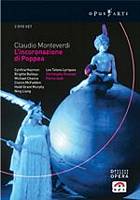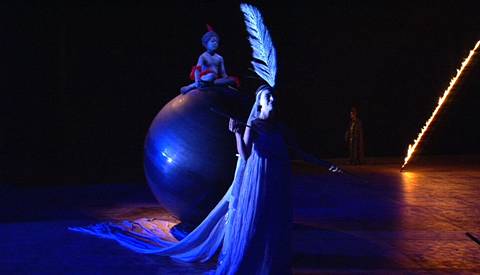
Idiomatic performance
Monteverdi's 'L'incoronazione di Poppaea' -
reviewed by
ROBERT ANDERSON'... highly gifted soloists ...'
|

|
As we continue our dismal progress into the 21st century, I wonder idly what might be
the equivalent period in imperial Roman history we have so far reached. Undoubtedly we have
passed Caligula; I think we have progressed beyond Nero; but I am not convinced we have yet
reached Elagabalus. At least I have not heard so far that the Conservatives have employed
this particular criterion (I leave that to your further research, dear reader) in their
choice of a new leader. I am less well-informed about 17th-century Venice and the steady
decline that transformed the republic from a trading city to one of glorious art.

A scene from the Prologue. DVD screenshot © 1994 NPS, 2005 Opus Arte
|
Resident in Venice from 1613, Monteverdi had his last surviving opera, Poppaea,
performed there thirty years later. Its success suggests that it conformed to the spirit
of the times, as it fundamentally does to ours. The prologue stages a losing battle
between Fortune, Virtue, and the exultant Cupid. In some later librettos a chorus of
Virtues is featured. Monteverdi never set them, and this is our sole chance to hear what
might have been, if imperial Rome had not been rampantly decadent. Wilke te Brummelstrote
makes a powerful plea for rectitude, but she sings in vain
[listen -- 'Deh, sommergiti, mal nata' (Prologue), DVD1 chapter 3, 0:00-1:07].
Cupid, sitting atop a world globe, and his assistant vocalist, win the day.
Continue >>
Copyright © 16 November 2005
Robert Anderson, London UK

|

